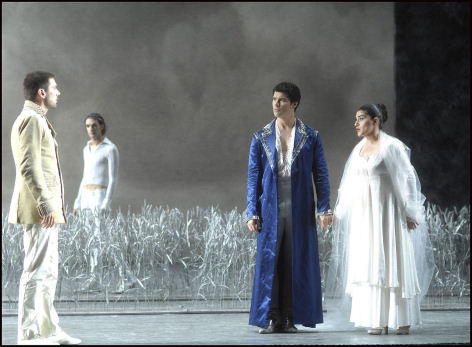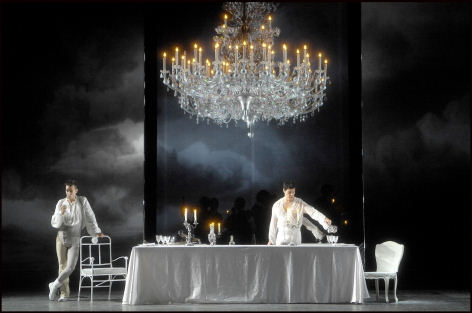Other Links
Editorial Board
- Editor - Bill Kenny
- London Editor-Melanie Eskenazi
- Founder - Len Mullenger
Google Site Search
SEEN
AND HEARD INTERNATIONAL OPERA REVIEW
Mozart, Don
Giovanni:
Soloists, ballet and chorus of the Opéra National de Montpellier,
orchestra of Le Concert Spirituel orchestra, Hervé Niquet
conductor. , Opéra National de Montpellier, France. 6.4.2008 (MM)

Mille
tre
seductions in Spain alone, six hundred forty in Italy, though but
one hundred in France [!], these numbers may add up to the number
of Don Giovanni productions that have failed around the
world, maybe last year alone. One sure thing -- Don Giovanni
seduces audiences into the opera house, and he most often leaves
them there.
Stage director
Jean Paul Scarpitta deployed a clinically suspect evaluation of
Don Giovanni's ‘Don Juan syndrome.’ Scarpitta's Don was not the
confident stud, instead a troubled young man and the Donna Anna
was the Freudian one, hanging desperately onto the Don despite the
threats of her father. Masetto was not a bumpkin, Zerlina was not
a pushover, and Donna Elvira was a woman deeply in love. Further
dramatic confusion ensued when the Don broke into hysterical
laughter in the first act finale, leaving us bewildered at
intermission, and frustrated that we had not been able to
comprehend the familiar music.
The Opéra National de Montpellier opened its latest version last
summer with two performances at the Festival de Radio France et
Montpellier, and continued the run with three more performances in
late March/early April. Intelligence gathered from conversations
in front of the opera house after the final performance revealed
that perhaps the summer performances had not been seductive, that
the rehearsals for the March reprise had deepened the characters,
and that with the final performance on April 6, this Don
Giovanni had arrived.
And seductive it was indeed, though with some bumps along the
way. As these well-known characters revealed themselves, one was
struck by their youth, all late twenties-early thirties. Primal
operatic fears (was this yet another premature use of
young-artist-program singers?) were allayed as they immediately
passed as finished artists, their youth displayed in fresh,
well-focused voices in handsome, histrionically expressive
postures.

The second act was the revelation, each of Mozart's actors pouring
out the torments of youthful love, the Don's Deh vieni alla
finestra sung mezza voce, almost vocally whispered,
transporting us inside a delicate psyche searching for love,
Zerlina palpably oozing love for Masetto in Vedrai carino,
Elvira possessed by love in Mi tradi, Donna Anna's mind
racing in Non mi dir, Ottavio's lovely Il mio tesoro
pitifully stated. The power of these expressions of love
transcended into the mind and soul of the young Don and induced
his chaotic and terrifying end (the corps de ballet, Da
Ponte's implied devils disguised as waiters, swarmed onto the
stage, cleared the dinner table and brought Scarpitta's banquet of
young love to its end).
The opera did seem to end here but after a while the survivors
finally appeared on stage, Ottavio quite alone, Zerlina and
Masetto quite together. Anna and Elvira then stepped forward and
grasped hands, sharing their youthful desolation. With them, and
with us was the young man who saw it all Leporello, always at the
side of the Don and absolutely as bewildered by love and life as
was his master, and perhaps as was the Montpellier matinee
audience recollecting its lost youth.
The second act achieved an almost unprecedented level of lyricism
as Scarpitta's concept was absorbed by conductor Hervé Niquet and
his early music ensemble Le Concert Spirituel, and driven to
dizzying heights by insanely fast if revelatory tempos. Niquet's
music was enacted with ultimate class by the Montpellier cast.
The American Franco Pomponi, bare-chested in white tights, infused
unusual nuance and complexity to the Don. The lithe Leporello of
the Dutch baritone Henk Neven evoked the possibility of a
definitive Leporello performance. The Italian Donna Anna,
Raffaella Milanesi now holds the record for having sung the
fastest Non mi dir in history, her love sick rival Donna
Elvira tenderly portrayed by French soprano Isabelle Cals.
Zerlina and her Masetto were large scaled characters deeply in
love, performed by Georgian born Anna Kasyan and French baritone
Nicolas Courjal. Finnish bass Petri Lindross provided a vocally
resplendent, very, very young Commendatore. Though graduated a
bit soon from his young artist program, tenor Cyril Auvity made
poor Don Ottavio really pitiful, earning for himself a huge
ovation.
Jean Paul Scarpitta took us inside Mozart's music, his stage and
costume design offering decor that supported but never defined
this interior space, as carefully lighted by Urs Schonebaum.
Michael Milenski
Pictures
©
Marc Ginot / Opéra National de
Montpellier
Back
to Top
Cumulative Index Page
